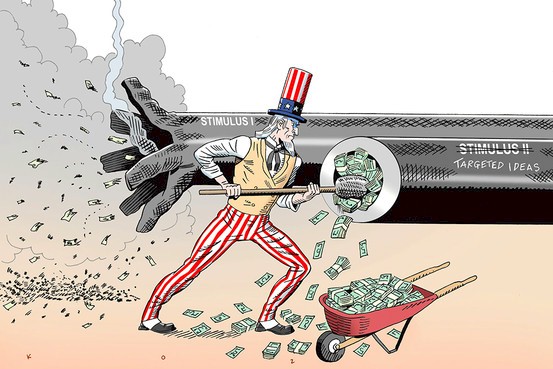Stimulus? There's No Stimulus Here.
The president wants to spend more, but don't ask him what the money is for.
By William McGurn
WSJ.com
Assuming that Barack Obama holds another White House press conference—his last was back in July—here's a question worth asking: If the stimulus is truly the success you and your team claim, why are you so reluctant to use the word?
It's a timely question, with Congress returning to Washington this week after a year of record spending. Right now the spotlight is on the effort by the Democratic leadership to ram through a health-care bill—any health-care bill—in time for the president to declare victory in his State of the Union. But a second stimulus may not be far behind, with the House having already passed a version before members left for Christmas.
The House approved its $154 billion second stimulus package in its last vote of 2009, little more than a week after a policy address Mr. Obama delivered at the Brookings Institution. In that Dec. 8 speech, he reviewed the progress of the earlier stimulus—the $787 billion American Recovery and Reinvestment Act of 2009—and used the occasion to call for additional congressional spending. The headlines rightly described what he was proposing as a "second stimulus."
Yet perhaps the most intriguing part of that speech is what the president did not say.
Not once did he use the word "stimulus." If you search under "speeches and remarks" on the White House Web site, it will tell you that the last time the president used the word "stimulus" in public remarks was in an offhand reference in a speech about clean energy in October. A month before that he used the term once in a speech that was about the stimulus.

Martin Kozlowski
The president's increasing shyness about the S-word does not appear to be a coincidence. Here's a snippet from a December exchange between White House Press Secretary Robert Gibbs and one reporter:
Reporter: "[W]hy are we talking about a second stimulus now?"
Mr. Gibbs: "Well, again, you haven't heard the President talk about a second stimulus. You heard the President discuss targeted ideas that he believes and the economic team believe will have a positive impact on private sector hiring, and creating an environment that will allow the private sector to make those hiring decisions positively."
Reporter: "So it's not a stimulus?"
Mr. Gibbs: "The President hasn't called it that and I don't believe it is."
Mr. Gibbs goes on to characterize the new package of billions in government spending as "targeted ideas." Hmm. Old Washington hands might rightly wonder whether there is not some memo circulating in the West Wing informing senior staffers that "stimulus" may have acquired a pejorative meaning to the American public—and that White House personnel ought to avoid the word when talking about new spending.
After all, Messrs. Gibbs and Obama are not alone. Others appear to have got the memo, too. While making the rounds of the Sunday shows this weekend, Christina Romer, chair of the White House Council of Economic Advisers, remarkably avoided saying "stimulus" herself. When CNN's John King specifically asked her about "more stimulus money being spent in the new year," she took a page out of Mr. Gibbs' book by speaking of "targeted actions."
Why the reticence? In itself, "stimulus" ought to be a political positive. After all, describing a bill as a stimulus assumes it will stimulate. Certainly that's the sense that Paul Krugman—a Nobel-winning economist and New York Times columnist—uses it when he complains that the first stimulus was too small.
Perhaps the reluctance to call the new package a second stimulus has something to do with the extravagant promises Mr. Obama made to sell the first. Less than a month into Mr. Obama's presidency, the first stimulus was pushed through partly on the promise that doing so would keep unemployment south of 8%. With Friday's jobs numbers, the same people who sold us that one now have to explain why keeping unemployment at 10% is progress.
A report from the Associated Press that came out yesterday cannot have helped. It analyzed what was thought to be one of the healthiest parts of stimulus—spending on roads and bridges—and concluded that the billions in taxpayer dollars have had "no effect on local employment." The article goes on to express surprise that "despite the disconnect, Congress is moving quickly to give Obama the road money" he wants for his second stimulus.
That's not disconnect. It's classic Beltway. In Washington when your policies don't work, you don't change them. You change the name and hope nobody notices.
Write to MainStreet@wsj.com